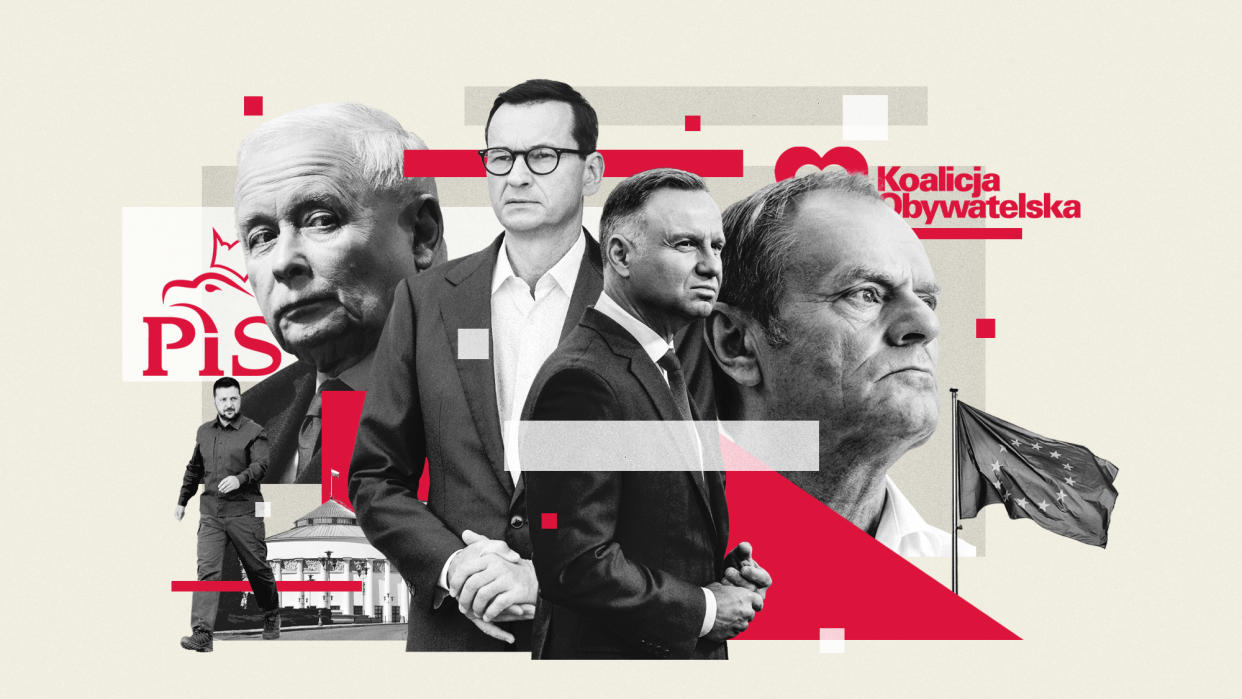What does the Polish election mean for the future of the EU?

- Oops!Something went wrong.Please try again later.
Poland's bitterly contested parliamentary election on Sunday could determine not only the country's immediate future but its place in the EU and its support for Ukraine.
"The stakes are unusually high," said The Economist. The ruling nationalist Law and Justice party (PiS), seeking an unprecedented third consecutive term, is led by former prime minister and current deputy PM Jarosław Kaczyński. The largest opposition grouping, the centre-right Civic Coalition (KO), is led by Donald Tusk – another former prime minister. Tusk, also the former president of the European Council, told his supporters that the ruling Eurosceptic party was planning – "systematically, in cold blood" – to take Poland out of the EU, which PiS denies.
But the "hatred" between the two men "runs much deeper" than this election, said The Economist; their feud is "almost as old as modern Poland and has come to define much of its politics".
Each man purports to believe the other "poses an existential threat to Poland", said the Financial Times – a nation of nearly 38 million people – "adding to the sense that this election will be the most important for the EU this year".
Opinion polls suggest that PiS will remain the largest party in parliament, according to Reuters, but "may fall short of a majority". This could lead to "legislative paralysis" in Poland, a Nato member state "of crucial logistical importance to the alliance's efforts to aid Ukraine".
What did the papers say?
Poland may be on the eve of a "peaceful revolution", said The New European. PiS is "Europe's most important nationalist, right wing, anti-women, homophobic, anti-European party", wrote Denis MacShane, a former Labour minister for Europe. The Polish president, Andrzej Duda, is also an ally of PiS.
PiS has "nudged Poland steadily to the illiberal right on abortion, media freedom and immigration", said MacShane. It has also "attacked Jews, the European Union, and neighbouring nations, such as Germany". The party "makes the Brexit Tories look like woke liberals". If the party is beaten, it will be "a major setback to the fashionable idea that the Right are on an unstoppable march across Europe".
Since PiS came to power in 2015, it has "repeatedly clashed with the EU" over reforms that critics believe have "politicised the judicial system", said Reuters. Kaczyński has also been "hammering home his party's message that Tusk is a German stooge" and beholden to its interests, as he grew up in a German-speaking household. Polish nationalists are increasingly expressing anti-German sentiment.
Current prime minister Mateusz Morawiecki has "packed courts and filled public media with propaganda" over the party's two terms, said The Economist. The "assault on the rule of law" during the party's two terms led the European Commission to "freeze billions of euros of pandemic funds earmarked for Poland".
Carlo Fidanza, an Italian MEP from the same political group as PiS, told Euronews that Poland's stance on Ukraine had been key to the EU's view on Russia's invasion, because of its "very strong opposition to Putin's expansionist policies". The re-election of PiS "would certainly be a factor of stability for the geopolitical posture of the European Union as a whole", he said.
On Sunday, Brussels "will be keeping an eye not only on the election but also on the Polish government's referendum", said the news site. Voters will be asked their view on four proposals: admitting migrants from the Middle East and Africa under an EU deal; the privatisation of state companies; raising the retirement age; and putting a fence on the border with Belarus.
What next?
"The election is a toss-up," said The Economist. PiS, polling at 36%, is "poised to take the largest share of the vote" – but to form a government it will need the support of others. But if KO does well, it could "forge a ruling coalition instead". Tusk's alliance is polling at about 30% and would "probably work with the Left and the Third Way, a centrist newcomer".
But in such a close race "turnout will be a deciding factor". Given their ages – Tusk is 66 and Kaczyński 74 – a new generation of voters "is tired of their duelling". The far-right Confederation party, polling at 9%, "could hold the balance of power".
The Confederation has "sought to harness a rise in anti-Ukrainian sentiment among some voters", said Reuters. A PiS government relying on Confederation votes "could be much less inclined to help Kyiv".
The anti-European Confederation "sways into territory far more extreme than anything seen in UK politics", said The New European – yet. But to the suggestion that PiS may take Poland out of the EU, "the disaster of Brexit means there is no support for Polexit".

